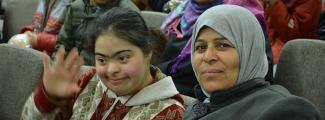“When we look at her now we can hardly believe our eyes!”
Thus said the mother of 8-year-old Inas, a girl with special needs, mental retardation and speech disorders. She currently lives with her family composed of 5 people in the Unfinished Buildings in extremely difficult living conditions after they were expelled from Rural Damascus (Hazzé).
The family was accompanied by ORVs to the community center near their home and introduced to SSSD services and activities.
The mother and her children expressed their delight when they came to the community center, discovering what it offers in support of people, which results in positive changes in their interaction with the milieu, particularly since they are strangers to the host community.
When the Domestic Rehabilitation Program was introduced in the CC, Inas’ mother was initiated into the Program within several sessions explaining its working mechanism and what it will offer to the girl in terms of skills and abilities. She quickly understood that it was indispensable that she becomes her daughter’s companion and follow her up home in order to achieve the desired goals.
Then we conducted the Portage Program Developmental Assessment with both mother and girl through some questions and direct application using some tools.
After preparing the girl’s household plan and presenting it to the mother, its working mechanism according to a daily routine was explained to her and some helping tools and tips presented. I personally helped the mother to recycle some tools, such as dolls made from old socks, numbers and letters from old books, pictures with words to help the matching process, in addition to the toolkit, which is extremely rich and helpful in achieving the goals.
After several follow-up sessions and re-evaluation of the girl, the achievement of some of goals that have been worked out was as follows:
ü Inas could not solve her problems without a certain amount of physical strain; now she asks adult assistance to help her solve her problems.
ü She did not follow the guiding rules of mental and physical games; now she can participate in competitions with the group and execute all tasks that are assigned to the group, whether racing or games that require assembling or matching pieces.
ü She did not talk about herself positively; now she tells her mother about some of the positive activities and tasks entrusted to her and information she has become familiar with. E.g., “I put my stuff in order”; “I played with my sisters while you were shopping”; etc.
ü She did not participate in role-playing; now she plays with her siblings and names the characters.
ü She did not describe the functions of things; now, when asked about the function of each tool, she responds correctly. E.g., “We use a pencil to write and draw”; “We use soap to clean hands”; “We use a toothbrush with toothpaste to clean the teeth.”
ü She could not use language to negotiate while playing with others; now she plays with other children and talks to them.
ü She did not follow instructions to perform tasks; now she meet her mother’s demands, which include more than one task. E.g., “After going out of the bathroom, please wash your hands and bring water to your little brother.”
ü She could not speak using long sentences; now she can tell me a story she learned or a situation she was exposed to.
ü She did not know how to cut and paste simple forms; now she knows to do that thanks to her presence in the activities and helps her mother.
ü The whole process reflected positively on the girls’ relationship with her siblings; she can now communicate with them better and share time, hobbies, and games with them.
Through activity follow-up and reviewing the plan periodically with the mother, the latter expressed the positive development in the girl. The next goals are currently worked out for further development, such as giving the girl some specific games to serve the goals planned and help achieve subsequent goals.
Since the mother is completely illiterate, the plan was explained to her and she has been followed up constantly. When the mother realized that she should be educated if she wanted to help her child, especially in simple educational matters, she asked to be helped through a literacy course. She is currently part of a women literacy group. She and her child are being followed up regularly at the community center so that she could transfer this knowledge to her children at home. She now searches for educational songs all by herself and prepares simple tools from empty boxes to serve the worked out plan.
Domestic Rehabilitation Program Specialist: Ibtihaj al-Harith

